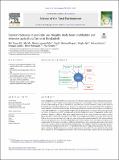Farmer's behavior in pesticide use : insights study from smallholder and intensive agricultural farms in Bangladesh
Abstract
Since independence and over the years, pesticides have become a dominant feature of Bangladesh agriculture. To protect farmers' health, environment and to improve sustainability of chemical pest control quantitative understanding of farmers' behavior in pesticide use is critical. However, study on the levels of knowledge and awareness of farmers and the practices of pesticide use are often limited. We conducted a broad analysis on the effects of knowledge and awareness of farmers as well as the influence of the different associated stakeholders such as pesticide retailers and the government, on farmers' behavior in pesticide use from a detailed survey of 917 agricultural households in different regions of Bangladesh. Within eight protective behaviors (PBs) or PPEs were largely influenced by the crops growers and regions. Never discarding empty pesticide containers in the field, never applying pesticides more than prescribed by DAE or the instruction manual, selecting new types of pesticides recommended by DAE and purchasing low toxicity pesticides were the most adopted practices. Most farmers from the South-East region were adopting the PB of wearing mask, gloves and long sleeved clothes when spraying and farmers from South trusted the recommendations of pesticides by village leaders and neighbors. Majority of vegetables growers were well informed that pesticides were very harmful to the quality of agricultural products, the environment, and human health but not rice or mixed crops growers. Generally, PBs were positively affected by the perception of the consequences of farmers' behavior and knowledge of pesticide use but negatively influenced by action of governments and trust of retailers. It is important to recognize the differences that exist among different crops growers and locations. Attempt needs to bridge the gap among crop growers, locations and different stakeholder such as government agencies and retailers to develop policy.
Citation
Ali , M P , Kabir , M M M , Haque , S S , Qin , X , Nasrin , S , Landis , D , Holmquist , B & Ahmed , N 2020 , ' Farmer's behavior in pesticide use : insights study from smallholder and intensive agricultural farms in Bangladesh ' , Science of the Total Environment , vol. 747 , 141160 . https://doi.org/10.1016/j.scitotenv.2020.141160
Publication
Science of the Total Environment
Status
Peer reviewed
ISSN
0048-9697Type
Journal article
Description
Funding was provided fully by USAID-sponsored Partnerships for Enhanced Engagement in Research (PEER) Program's Cycle 6 project, entitled “Ecosystem services in a changing climate; assessing critical services in Bangladesh rice production landscapes.” PEER is implemented by U.S. National Academy of Sciences (NAS) via USAID and NAS Prime Agreement No. AID-OAA-A-11-00012. D.L. (US partner on the PEER grant) acknowledges support from the National Science Foundation Long-term Ecological Research Program (DEB 1832042) at the Kellogg Biological Station, Michigan State University South Asia Partnership and MSU AgBioResearch.Collections
Items in the St Andrews Research Repository are protected by copyright, with all rights reserved, unless otherwise indicated.

